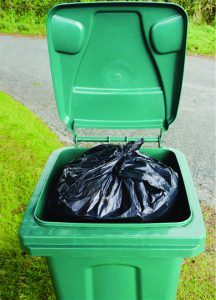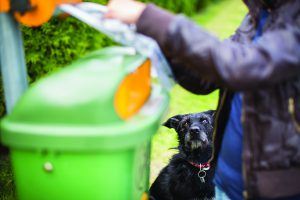‘Cleaner Communities Day’ at the start of July, is an annual event from the Chartered Institute of Waste Management which we are proud to be involved in.
Now in its third year, it equips both the private sector and local authorities with the hottest topics from the street cleansing sector. We’re looking forward to hearing speakers from a number of high profile organisations including Keep Britain Tidy and Greggs, who will be sharing their thoughts and encouraging debate.
Simplifying the process
 Improving and simplifying our recycling and waste management infrastructure, supported by clear and concise behaviour change campaigns, are critical factors in helping to keep our streets clean. Discarded items that escape collection for recycling have a detrimental effect on our environment.
Improving and simplifying our recycling and waste management infrastructure, supported by clear and concise behaviour change campaigns, are critical factors in helping to keep our streets clean. Discarded items that escape collection for recycling have a detrimental effect on our environment.
Central government leadership and delivery strategies are required to help focus attention and resource, and provide a catalyst for real action. The government has recently, for example, set out proposals in its ‘Consultation on Consistency in Household and Business Recycling Collections in England,’ looking at greater conformity on a national level in the collection of items in kerbside recycling, and residual waste, which would make communication in this area easier.
A comprehensive network of litter and recycling bins for people to use on the go, located conveniently and emptied at appropriate frequencies is also critical. The #LeedsByExample campaign is an excellent example of a campaign in this area.
The project created by environmental charity, Hubbub with the support of compliance scheme, Ecosurety, major brands and retailers, Leeds City Council, and local institutions aims to boost the recycling of food and drinks packaging. We were delighted to support this ground-breaking recycling project in our local area, by providing over 20,000 waste sacks made from recycled material to support the campaign over its six-month duration. We also formed part of the voluntary team helping to raise awareness of the campaign during its first week of launch in October 2018.
Only 42% of local authorities provide recycling for packaging used on the go, and the trial campaign highlighted the need to use recycling bins while concurrently encouraging the general public not to contaminate recycling bins with general non-recyclable waste. Backed by some major brands, it is hoped similar solutions can be rolled out nationwide.
The project trialled a range of different methods including pioneering technology, new recycling facilities and engaging communications. Twenty new on-street yellow recycle bins enable people to recycle their empty plastic and drinks cans, whilst coffee cups can be recycled in orange bins or at participating coffee shops. A ‘We Recycle app’ enables people to scan their drinks packaging or coffee cup and find their nearest recycling bin.
Taking action
 As individuals one of the best things we can do to prevent littering is by using appropriate bins and reporting any overflowing of bins. Another great way to help is to take part in a local litter pick. In addition to supplying products which help organisations to be more resource efficient, we’re proud to annually support a number of environmental projects, as we’ve highlighted in previous blog posts. This includes The Great British Spring Clean and the Upstream Battle campaign led by Keep Scotland Beautiful which help make a difference to the cleanliness of our streets and protect our planet.
As individuals one of the best things we can do to prevent littering is by using appropriate bins and reporting any overflowing of bins. Another great way to help is to take part in a local litter pick. In addition to supplying products which help organisations to be more resource efficient, we’re proud to annually support a number of environmental projects, as we’ve highlighted in previous blog posts. This includes The Great British Spring Clean and the Upstream Battle campaign led by Keep Scotland Beautiful which help make a difference to the cleanliness of our streets and protect our planet.
On the business side, organisations should ensure that there are plenty of segregated recycling bins in their facilities. These should be clearly labelled and regularly emptied.
Together with a number of other companies based on the Sherburn Industrial Estate where we are based, we also support the Clean Driver Scheme. This innovative project was launched in our business environment last August by Selby District Council. Funded by the Waste and Resources Action Programme (WRAP), it encourages lorry drivers visiting the district to dispose of their rubbish responsibly.
Businesses signing up to the scheme receive an in-cab tidy package that gives drivers litter bags for their rubbish, reusable coffee cups, and pocket ashtrays to encourage responsible rubbish disposal.
In addition, to further support the Clean Driver Scheme, along with neighbouring company, Cranswick Gourmet Bacon (part of Cranswick plc) we have funded brand new litter bins on the industrial estate.
Drivers taking part in the scheme display their support with cab window stickers. The package also includes information about local facilities, such as litter bins, in graphics format so the information will be accessible to drivers from other countries.
Selby District Council conducted analysis of the Clean Driver Scheme which revealed a positive impact. They carried out litter monitoring for three consecutive weeks prior to launching the campaign to gather baseline information. Further monitoring of the same areas was conducted four weeks after the launch, for a three-week period. Results saw a reduction of 30% and 46% in two of the areas monitored.
A partnership approach
I’m encouraged by the cooperation between different industry sectors in response to the recent government consultations for its Resources and Waste Strategy for England.
Collaborative work is needed across industry sectors to deliver anti-littering, behaviour-change and educational campaigns to maximise recycling. We all want to stop materials being discarded on our streets, leaking from the economy and entering the marine environment from our shores, or ending up in landfill. Working together, we can become champions for cleaner communities. Meanwhile, litter – especially marine litter, although a serious issue, is diverting much attention from the more dangerous and dare-I-say it, more pressing problem of climate change. We need to focus more on resource efficiency and carbon reduction programs to combat this bigger issue, that will be the subject of a forthcoming blog.